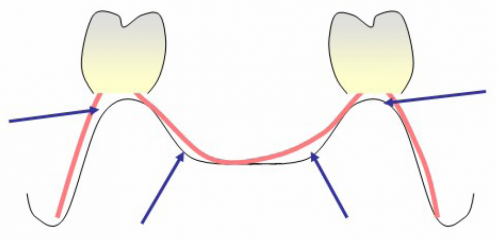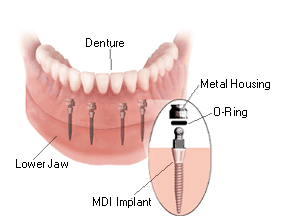Many people have false teeth and are concerned about them being loose, wobbly or unstable. Dentures need plenty of loving care and attention in order to keep them in the best condition and serving you well… This article takes a look at all of your denture care needs, how to fix loose dentures and answer some of the top questions people ask when they have false teeth.
False teeth and mouth sores
Dentures can unfortunately sometimes cause mouth sores, this is particularly true on fall lower dentures where there is a tendency for the denture to slide around over your gums. The real secret to preventing mouth sores is to ensure your dentures fit exceptionally well.
How to Ensure Your Dentures Fit
there are 2 secrets to getting dentures to fit really well:
- Accuracy at the beginning
- Maintenance
How well a denture fits when you have originally fitted is dependent upon multiple factors including the skills of the dentist, the accuracy of the impression that was sent to the laboratory and the skills of the technician. As with many things in life, you get what you pay for and cheap dentures can often be more trouble than they are worth in the long run.
In order for dentures to be really accurate at the beginning the communication between the dentist and the technician needs to be excellent, this is why many dentists work closely with a clinical dental technician.
A clinical dental technician has undertaken an extensive amount of additional training to enable them to work directly with the patient, this means a clinical technician can have a discussion with you, take impressions, try in the denture at an early stage and then manufacture the denture themselves.
This means any chance of miscommunication is eradicated and you deal directly with the person making your dentures, in our opinion this is one of the best ways to have the best fitting and longest lasting dentures.
Meet our clinical dental technician

Kevin Thomas – Clinical Technician
Dip Clin Dent Tech RCS Eng 2011, Certification in Dental Technology City & Guilds 1979
GDC No. 145573
Maintenance is also incredibly important.
Your dentures will not change shape overtime but the gums on which they sit will. As we age, jaw bone changes shape and the gum changes with it. This is particularly true if you have had teeth extracted.
This means that whilst your denture may fit perfectly at the beginning your dentures can become loose overtime. This is not because the denture has changed, it is because you’re gums have.
This is why your dentist or clinical dental technician may recommend a periodic reline, a reline is exactly as the name suggests… It is creating a new fitting surface for your denture. The part of your denture that you see remains exactly the same but a new fitting surface is created which takes up any space that has developed due to the changing shape of your gum.

How to Care for Dentures at Night
The classic image of looking after a denture and a glass by your bed at night does unfortunately have a ring of truth about it. The acrylic resin which makes up dentures can dry out too much, if this happens the denture can begin to crack and weaken. The acrylic needs to be kept wet and so leaving them in water or a cleaning solution overnight can really help to make your dentures last longer and look better.
Should I wear dentures all the time?
We don’t recommend you wear dentures all of the time overnight. This is because bacteria can easily build up when your mouth is closed as you sleep, it’s far better that you store your dentures in a cleaning solution overnight, clean them and then pop them in fresh in the morning. Special denture cleanser containers can be purchased.
Wearing dentures all of the time can result in plaque buildup and white patches on the dentures which in turn looks rather nasty and can contribute to bad breath.
What’s the best toothpaste for dentures?
We don’t recommend using regular toothpaste on dentures as toothpaste very often has an abrasive designed to clean the enamel on your teeth. If you use this same toothpaste on your dentures you can wear the denture away as the acrylic is much softer.
We then recommend using a special denture cleaner, usually in the form of a tablet dissolved into water with a soft bristled brush to remove food deposits prior to storing your denture overnight in a cleaning solution.
You should continue to clean your natural teeth with a regular dental toothpaste to remove plaque.
If you want that fresh minty taste when you put your dentures in then give them a quick dunk into a mint mouthwash.
Professional denture cleaning
It’s also possible for your dentist or clinical technician to clean your dentures. They will have an ultrasonic bath with a special liquid design to dissolve dental plaque, combining the ultrasound waves with the liquid can help to clean your denture.
Ask about this service when you next visit your dentist.
Gum care after dentures
Even once you have dentures it’s still important visit your dentist, they will be there to look after your teeth if you have any left and also your gums.
If you have full dentures and therefore no teeth we recommend that you lightly brush your gums each night, this can get rid of any unhealthy bacteria. It is also important to brush your tongue for the same reason.
Regular visits to your dentist will also ensure you have an annual oral cancer screening, this is still important and a good reason to continue seeing your dentist even if you have noted.
Living with loose dentures
Living with loose dentures can be uncomfortable, painful and distressing. As already mentioned in this article it’s important that you continue to visit your dentist to ensure the dentures fit, the first course of action is likely to be a reline to ensure the dentures fit excellently.
For some people their anatomy does not lend itself to having dentures which fits well. If you have a particularly flat palate on the upper or a flat reach on your lower jaw then the denture will tend to slide around. In this instance sometimes the only option is to have a couple of dental implants placed.
The dental implants sit permanently in your mouth and have a little pop studs on top, the denture then has reciprocal parts of these pop studs added on the inside and when you place your denture in your mouth it clicks in with an audible click.
This type of denture stabilisation can either be done for a new dentures or your existing denture can be modified.

Zubair Sacranie
Latest posts by Zubair Sacranie (see all)
- What To Do When Half Your Tooth Breaks Off? - 31st March, 2025
- Dental Implants in Solihull: Your Complete Guide - 28th January, 2025
- When Do Baby Teeth Fall Out and Adult Teeth Come In? - 1st December, 2024


